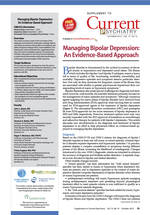Bipolar disorder is characterized by the cyclical occurrence of elevated (manic or hypomanic) and depressed mood states. The illness, which includes the bipolar I and bipolar II subtypes, exacts a heavy toll in terms of quality of life, functioning, morbidity, comorbidity, and mortality.1 Depressive episodes and symptoms deserve particular attention: Not only do they dominate the long-term course of the illness; they are associated with similar or greater psychosocial impairment than corresponding levels of manic or hypomanic symptoms.1
CME Supplements
Managing Bipolar Depression: An Evidence-Based Approach
Current Psychiatry. 2013 October;12(10)
This activity is jointly sponsored/co-provided by Global Medical Education, HealthmattersCME, and Postgraduate Institute for Medicine. This activity is supported by an independent educational grant from Sunovion Pharmaceuticals.


